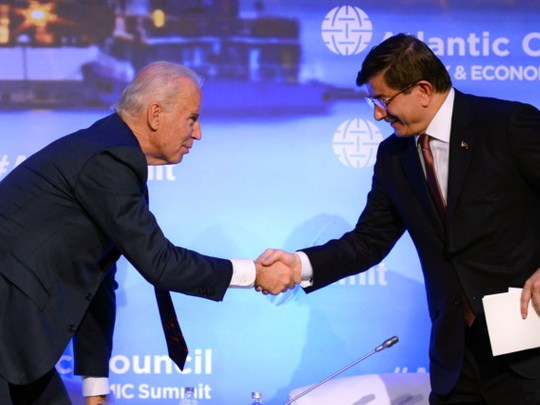
Istanbul: US Vice President Joe Biden on Saturday meets Turkish President Recep Tayyip Erdogan aiming to ease strains over the crisis in Syria and persuade Turkey to step up its support for the coalition against Daesh militants.
The trip to Istanbul by Biden, the highest ranking US official to visit Turkey since Erdogan won election as president after over a decade as prime minister, comes amid unusual tensions in the traditionally strong relationship between the two NATO allies.
Washington is frustrated by the relatively limited role played by Turkey in the fight against Daesh militants who have seized swathes of Iraq and Syria right up to the Turkish border.
Turkey in turn is upset that its contribution in hosting 1.6 million refugees from the Syrian conflict has gone relatively unrecognised and is wary of supporting the Kurdish fighters battling Daesh.
Biden personally stung Erdogan last month by suggesting his policies in supporting Islamist rebel forces in Syria had helped encourage the rise of Daesh, a slight that prompted the president to warn his relationship with the US number two could be “history”.
But the straight-talking Biden said after arriving in Istanbul that openness was a key part of the US-Turkey relationship.
“Friends don’t let the other wonder about what they are thinking,” said Biden.
Biden is due to meet Erdogan on the shores of the Bosphorus on Saturday afternoon.
In talks late Friday with Prime Minister Ahmet Davutoglu, Biden agreed on the need to “degrade and defeat Daesh” as well as work to a “political transition” in Syria, the US administration said, without giving further details.
So far, Turkey’s sole contribution to the coalition has been allowing a contingent of Iraqi peshmerga Kurdish fighters to transit Turkish soil to fight Daesh militants for control of the Syrian border town of Kobane.
The government has also so far refused to allow US forces to stage bombing raids from the Incirlik air base in southern Turkey, forcing them to make far longer sorties from the Gulf.
A senior US administration official told reporters ahead of the talks that both Turkey and the United States were in agreement on the need to do more to combat Daesh in both Iraq and Syria.
But the official conceded that while the United States was aiming for a transition in Syria that did not include Al Assad, its “highest priority” was to defeat Daesh.
This puts Washington at odds with Turkey, which wants ousting Al Assad to be given the same strategic importance as defeating Daesh.
But the official indicated that one of Turkey’s key demands - the creation of a security zone inside Syria - could be created by the FSA if it took control of the area.
“You can imagine a scenario in which you have a more robust opposition on the ground that was more capable of clearing and holding terrain,” the official said, emphasising this was different from having the international community declare a safe zone.
The US official acknowledged it would be “useful to have more access to Turkish facilities” to better help the forces combatting Daesh.
US military sources have in recent days expressed increasing confidence about the progress of the battle against Daesh militants fighting for the strategic Syrian border town of Kobane.
The top US envoy for the coalition, John Allen, told a Turkish newspaper this week that Daesh had effectively “impaled” itself on Kobane by pouring fighters into the town who could then be bombed by coalition war planes.










